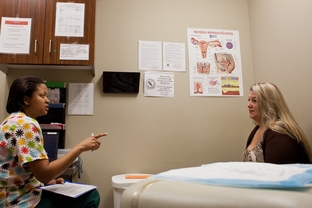Time Running Out for Women's Health Providers

The clock is ticking for reproductive health clinics that are affiliated with abortion providers — the state will force Planned Parenthood and others like them out of the Women’s Health Program between May 1 and May 15.
In the meantime, the state's Health and Human Services Commission is scrambling to find providers to make up the difference, because Planned Parenthood clinics treated some 40 percent of the women in the program. They’re reaching out to enlist Federally Qualified Health Centers, family practice doctors and even OBGYN medical residency programs, which have a wider geographic distribution. In some cases they’re having to try to re-interpret the language of the new rule — for example, if a medical resident has had training performing abortions, would the entire residency program be disqualified from the program?
One mark in the state’s favor as it seeks to bolster its ranks of providers: Because the program is no longer affiliated with Medicaid — the result of the federal government pulling back its funding — it isn’t tied to paying Medicaid reimbursement rates. If it gets in a bind, the state could try to find the funding to increase the rates, making participation more appealing to providers. (But first they’d have to find the money in the budget.)
In the midst of much hospital handwringing over the funding restructuring and regional health partnerships required under the state’s new Medicaid waiver, the House County Affairs Committee could get an earful at its meeting next Tuesday.
There are fights over who’s winning and who’s losing: The private hospitals largely believe the financial changes — the result of Texas losing one pot of federal funding because it expanded managed care statewide — have benefited the public hospitals at the expense of the privates. They’ve got roughly three weeks to negotiate possible alternative formulas and find potential solutions.
And some disagreements linger over which regional health centers will agree to partner up to forge the allegiances the so-called “1115 waiver” calls for. “The intensity and gravity that’s facing the state is, you’re asking people to get along who have been competing for the last century,” said Tom Banning, CEO of the Texas Academy of Family Physicians.
• House lawmakers could be reigniting their effort to get small cigarette manufacturers to start paying a state tax paid by their larger competitors. Next week, the Ways and Means Committee will meet to “examine revenue derived from tobacco manufacturers” — including the half a billion dollars large tobacco companies already pay the state every year as part of a 1998 lawsuit settlement. Those big tobacco companies would like to share the burden with small tobacco — and lawmakers would certainly like the money to roll into state coffers. But small cigarette manufacturers have so far successfully resisted those efforts, arguing that they weren’t part of the lawsuit, and shouldn’t be singled out for a tax. Also in play: Many lawmakers have signed pledges against increasing or creating taxes, which could play against those who want to change the tobacco levies.
• The following week, expect two days of intense health care discussions before the Senate Health and Human Services Committee. On May 8, lawmakers will try to find even more “cost-containment measures” — ways to tighten up the state’s health spending and find additional budget-balancing savings — even though it seemed they left no stone unturned last session. They’ll also evaluate how well health care quality initiatives passed in 2011 are working, though it will likely be too soon to tell. On May 9, they’ll address shortcomings in the state’s mental health system and make recommendations for improving access to treatment.

